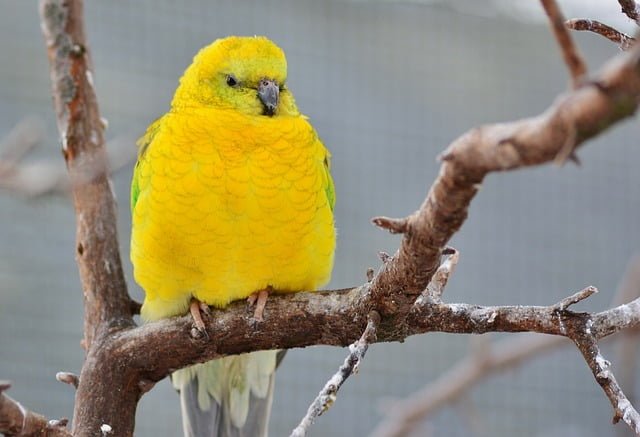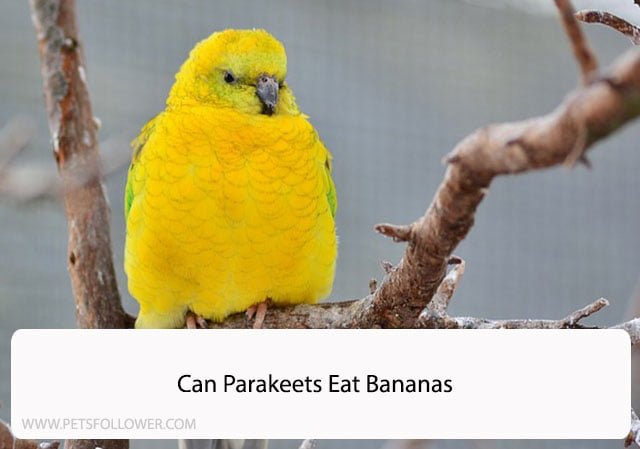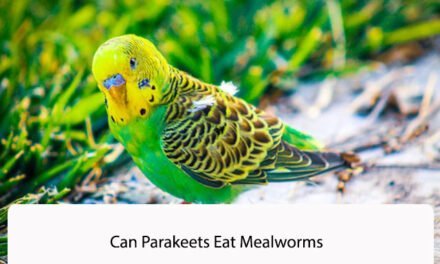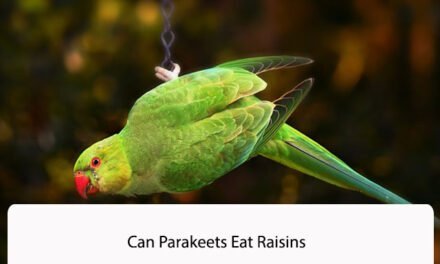Parakeets, also known as budgies, are popular pets around the world due to their colorful appearance and engaging personalities. As a responsible pet owner, it’s important to provide your feathered friend with a balanced and nutritious diet. While seeds are a staple in a parakeet’s diet, it’s natural to wonder if other foods, such as bananas, are safe for them to eat.
Bananas are a common fruit that many people enjoy, but can parakeets eat them? The answer is yes, parakeets can eat bananas! Bananas are a great source of vitamins and minerals, such as potassium, vitamin C, and vitamin B6, which can help support your parakeet’s overall health. However, it’s important to remember that bananas should only be given to your parakeet in moderation, as they are high in sugar and can lead to weight gain if overconsumed.

Understanding Parakeets’ Dietary Needs
Parakeets are lovely and intelligent birds that require a balanced diet to stay healthy. As pet owners, it is our responsibility to ensure that we provide them with the right type and amount of food to meet their nutritional needs.
A well-balanced diet for a parakeet should consist of:
- Fresh fruits and vegetables
- High-quality bird seed mix
- Pellets
- Clean water
It is essential to provide parakeets with a variety of fresh fruits and vegetables to ensure that they receive all the necessary vitamins and minerals. Some of the best fruits and vegetables for parakeets include:
- Apples
- Bananas
- Broccoli
- Carrots
- Spinach
When it comes to bird seed mix, it is crucial to choose a high-quality one that is free from any harmful additives. A good bird seed mix should contain a variety of seeds, including millet, canary seed, and sunflower seeds.
Pellets are also an excellent source of nutrition for parakeets. They are specially formulated to provide all the necessary vitamins and minerals that parakeets need to stay healthy. Pellets should make up about 50% of a parakeet’s diet.
Finally, clean water is essential for parakeets. It is recommended to change their water daily and to provide them with fresh, clean water at all times.
In conclusion, understanding a parakeet’s dietary needs is crucial to ensure that they stay healthy and happy. By providing them with a well-balanced diet that includes fresh fruits and vegetables, high-quality bird seed mix, pellets, and clean water, we can help them live a long and healthy life.
Can Parakeets Eat Bananas?
We often wonder if our feathered friends can eat the same fruits and vegetables that we humans enjoy. One such fruit that we may have in our kitchen is bananas. So, can parakeets eat bananas? The answer is yes, they can!
Bananas are a good source of vitamins and minerals that can benefit parakeets. They contain vitamins B6 and C, potassium, and dietary fiber. However, it is important to keep in mind that bananas should only be given to parakeets in moderation as they are high in sugar.
When feeding bananas to parakeets, it is important to make sure they are ripe but not overripe. Overripe bananas can cause digestive issues in parakeets and should be avoided. It is also important to remove any seeds from the banana before feeding it to your parakeet.
In addition to feeding bananas as a treat, you can also incorporate them into your parakeet’s diet by mixing small pieces of banana with their regular food. This can provide a nutritional boost and add variety to their diet.
Overall, bananas can be a healthy and tasty addition to your parakeet’s diet when given in moderation and prepared properly.
The Nutritional Value of Bananas for Parakeets
Bananas are a delicious and nutritious fruit that can be enjoyed by humans and animals alike. But can parakeets eat bananas? The answer is yes! Bananas can be a healthy addition to your parakeet’s diet, as they are rich in essential vitamins and minerals.
Here are some of the nutritional benefits of bananas for parakeets:
- Vitamin B6: Bananas are a good source of vitamin B6, which is important for maintaining a healthy immune system and promoting proper brain function.
- Vitamin C: Bananas also contain vitamin C, which can help boost your parakeet’s immune system and protect against disease.
- Potassium: Bananas are rich in potassium, which is essential for maintaining healthy muscles and nerves.
- Fiber: Bananas are a good source of fiber, which can help regulate your parakeet’s digestive system and prevent constipation.
It’s important to note that while bananas can be a healthy addition to your parakeet’s diet, they should not be fed in excess. Too much fruit can lead to weight gain and other health problems. As with any new food, it’s best to introduce bananas gradually and in small amounts, to ensure that your parakeet tolerates them well.
In conclusion, bananas can be a nutritious and tasty treat for your parakeet. By incorporating small amounts of this fruit into your parakeet’s diet, you can help provide them with essential vitamins and minerals to keep them healthy and happy.

How to Serve Bananas to Parakeets
Preparation
When serving bananas to parakeets, it is important to properly prepare the fruit. First, make sure the banana is ripe, but not overly ripe. An overly ripe banana can be too soft and difficult for a parakeet to eat. Next, peel the banana and remove any strings or seeds. Cut the banana into small pieces, about the size of a pea, to make it easier for the parakeet to eat.
Portion Size
When feeding bananas to parakeets, it is important to remember that they should only be a small part of their overall diet. We recommend offering a small piece of banana once or twice a week as a treat. Overfeeding bananas can lead to health problems such as diarrhea and obesity.
It is also important to note that bananas should not be the only fruit offered to parakeets. A variety of fruits and vegetables should be included in their diet to ensure they are receiving a balanced nutrition.
In summary, serving bananas to parakeets can be a healthy and enjoyable treat when done in moderation. Proper preparation and portion control are key to keeping your parakeet healthy and happy.
Potential Risks of Feeding Bananas to Parakeets
Feeding bananas to parakeets can be a healthy and tasty treat, but it is important to be aware of the potential risks associated with this fruit.
One of the main concerns when feeding bananas to parakeets is the high sugar content. While a small amount of sugar is necessary for energy, too much sugar can lead to health problems such as obesity, diabetes, and other metabolic disorders. Therefore, it is important to limit the amount of banana given to your parakeet and to balance it with other healthy foods.
Another risk associated with feeding bananas to parakeets is the potential for choking. Bananas can be a soft and sticky fruit, which can cause problems if your parakeet tries to swallow a large piece. To prevent choking, it is recommended to cut the banana into small pieces or mash it up before feeding it to your parakeet.
Finally, bananas can also cause digestive problems in some parakeets. If your parakeet experiences diarrhea or other digestive issues after eating bananas, it may be best to avoid feeding this fruit altogether.
In conclusion, while bananas can be a healthy and tasty treat for parakeets, it is important to be aware of the potential risks associated with this fruit. By limiting the amount given, cutting it into small pieces, and monitoring your parakeet’s digestive health, you can safely incorporate bananas into their diet.
Alternatives to Bananas
If you are looking for some variety in your parakeet’s diet or your parakeet doesn’t like bananas, don’t worry! There are plenty of other fruits and vegetables that are safe and healthy for your feathered friend to enjoy.
Here are some alternatives to bananas that you can try:
1. Apples
Apples are a great source of vitamins and fiber for your parakeet. Make sure to remove the seeds and core before feeding them to your bird.
2. Berries
Blueberries, strawberries, raspberries, and blackberries are all safe for parakeets to eat. They are also rich in antioxidants and vitamin C.
3. Grapes
Seedless grapes are a tasty and nutritious treat for your parakeet. Make sure to cut them in half to prevent choking.
4. Mango
Mango is a sweet and juicy fruit that is high in vitamin A and fiber. Make sure to remove the skin and pit before feeding it to your bird.
5. Carrots
Carrots are a great source of vitamin A and beta-carotene. Cut them into small pieces or shred them for your parakeet to enjoy.
Remember to always introduce new foods slowly and in small quantities to avoid upsetting your parakeet’s stomach. And always make sure to wash fruits and vegetables thoroughly before feeding them to your bird.
Conclusion
In this article, we have explored the question of whether parakeets can eat bananas. Based on our research, we can confidently say that yes, parakeets can eat bananas as part of a balanced diet.
While bananas are not a natural part of a parakeet’s diet, they can provide a good source of vitamins and minerals. However, it is important to note that bananas should only be given to parakeets in moderation, as they are high in sugar and can lead to health problems if over-consumed.
When feeding parakeets bananas, it is important to ensure that the fruit is ripe and has been thoroughly washed and peeled. Additionally, parakeets may prefer smaller pieces of banana, so it may be necessary to cut the fruit into small chunks or slices.
Overall, while bananas should not be the main source of nutrition for parakeets, they can be a healthy and tasty addition to their diet. As with any new food, it is important to introduce bananas gradually and monitor your parakeet’s reaction to ensure that they do not have any adverse reactions.

Frequently Asked Questions
Are bananas safe for parakeets to eat?
Yes, parakeets can safely eat bananas in moderation. Bananas are a great source of vitamins and minerals, such as potassium and vitamin C, which can help keep your parakeet healthy. However, too many bananas can lead to digestive problems, so it’s important to limit their intake.
What fruits can be safely given to parakeets?
Parakeets can safely consume a variety of fruits, including apples, pears, berries, and melons. These fruits are a great source of vitamins and minerals that can help keep your parakeet healthy. However, it’s important to introduce new fruits slowly and in small amounts to avoid digestive problems.
Can parakeets eat tomatoes?
Yes, parakeets can safely eat tomatoes in moderation. Tomatoes are a good source of vitamins and minerals, such as vitamin C and potassium, which can help keep your parakeet healthy. However, the leaves and stems of the tomato plant are toxic to parakeets, so it’s important to only feed them the ripe fruit.
Is it safe for parakeets to eat grapes?
Yes, parakeets can safely eat grapes in moderation. Grapes are a good source of vitamins and minerals, such as vitamin C and potassium, which can help keep your parakeet healthy. However, it’s important to remove the seeds before feeding them to your parakeet, as they can be a choking hazard.
Can parakeets safely consume blueberries?
Yes, parakeets can safely eat blueberries in moderation. Blueberries are a good source of vitamins and minerals, such as vitamin C and antioxidants, which can help keep your parakeet healthy. However, it’s important to introduce new fruits slowly and in small amounts to avoid digestive problems.
Are strawberries safe for parakeets to eat?
Yes, parakeets can safely eat strawberries in moderation. Strawberries are a good source of vitamins and minerals, such as vitamin C and antioxidants, which can help keep your parakeet healthy. However, it’s important to remove the leaves and stem before feeding them to your parakeet, as they can be a choking hazard.





